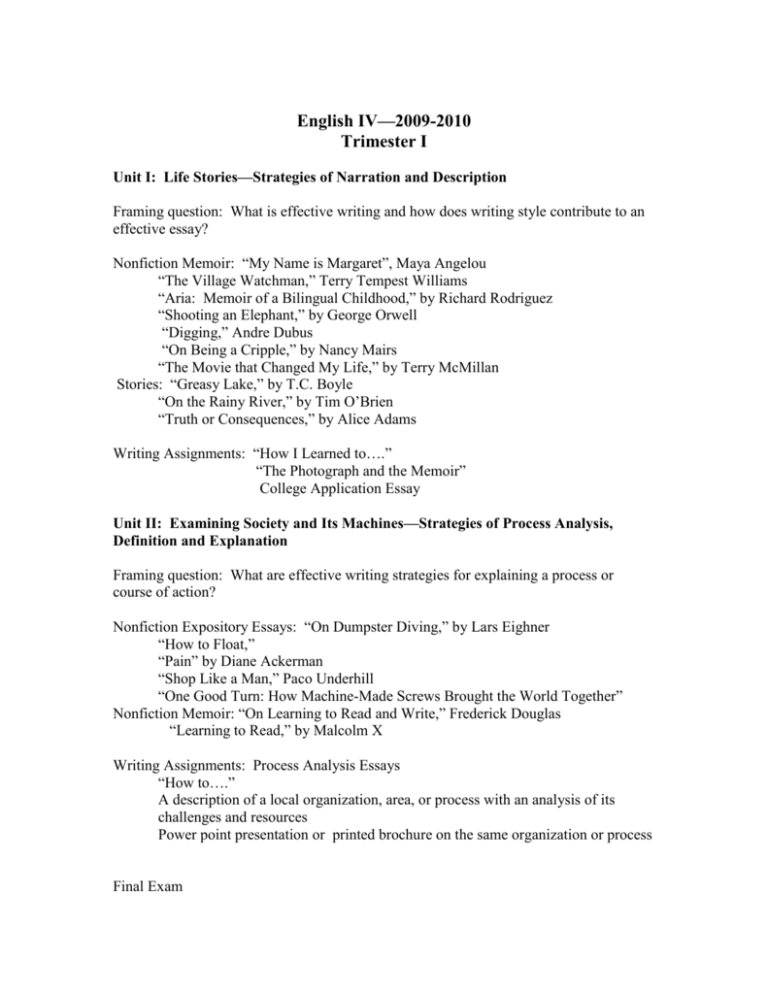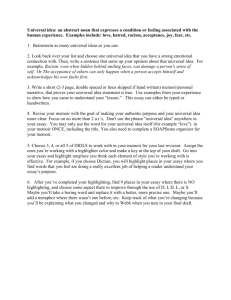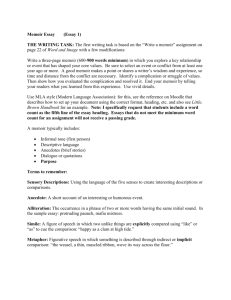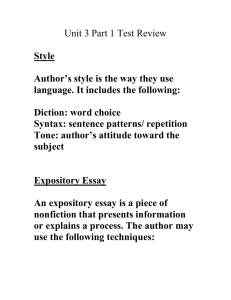TTaylor CNM 2009-09-05 137
advertisement

English IV—2009-2010 Trimester I Unit I: Life Stories—Strategies of Narration and Description Framing question: What is effective writing and how does writing style contribute to an effective essay? Nonfiction Memoir: “My Name is Margaret”, Maya Angelou “The Village Watchman,” Terry Tempest Williams “Aria: Memoir of a Bilingual Childhood,” by Richard Rodriguez “Shooting an Elephant,” by George Orwell “Digging,” Andre Dubus “On Being a Cripple,” by Nancy Mairs “The Movie that Changed My Life,” by Terry McMillan Stories: “Greasy Lake,” by T.C. Boyle “On the Rainy River,” by Tim O’Brien “Truth or Consequences,” by Alice Adams Writing Assignments: “How I Learned to….” “The Photograph and the Memoir” College Application Essay Unit II: Examining Society and Its Machines—Strategies of Process Analysis, Definition and Explanation Framing question: What are effective writing strategies for explaining a process or course of action? Nonfiction Expository Essays: “On Dumpster Diving,” by Lars Eighner “How to Float,” “Pain” by Diane Ackerman “Shop Like a Man,” Paco Underhill “One Good Turn: How Machine-Made Screws Brought the World Together” Nonfiction Memoir: “On Learning to Read and Write,” Frederick Douglas “Learning to Read,” by Malcolm X Writing Assignments: Process Analysis Essays “How to….” A description of a local organization, area, or process with an analysis of its challenges and resources Power point presentation or printed brochure on the same organization or process Final Exam Trimester II Unit I: Persuasion and Argument –How to Argue Framing question: What rhetorical techniques are useful for persuading someone to take a course of action? Summarizing and responding to an argument Contrasting two points of view: “I Surf, Therefore I Am,” by Judith Levine, and “Designs for Living on the Internet,” by Esther Dyson Using examples: “The Declaration of Independence,” by Thomas Jefferson Using ethos, pathos and logos: “Letter from a Birmingham Jail, by Martin Luther King Essay test on “Letter from a Birmingham Jail” Writing Project: “The Researched Argument” Unit II: Gender and Social Expectations—Literary Responses Framing question: How have authors incorporated ideas about gender roles into their critiques of society? Three stories of young men: “A&P” by John Updike, “Almos’ a Man,” by Richard Wright, and “Paul’s Case,” by Willa Cather Literary essay: Is society to blame for mistakes made by young men? Analyzing the “futile gesture” in three stories. Three stories of women: “The Yellow Wallpaper,” by Charlotte Perkins Gilman, “A Jury of Her Peers,” by Susan Glaspell, and “The Five-Forty-Eight,” by John Cheever “Cora Unashamed,” by Langston Hughes Play: “A Doll’s House,” by Henrik Ibsen A paper on gender issues in literature takes the place of a final exam Trimester III Unit I: The Tragic Hero and the Comic Hero Framing questions: What are the contrasts between the tragic point of view and the comic point of view? What techniques are used in tragedy and what are used in comedy? How do both contribute to our understanding of fate? A Tragic Play: “Oedipus Rex,” by Sophocles Completion of “The Sophocles Project” Two comic movies: “Modern Times,” and “Some Like It Hot” Satire: “A Modest Proposal” by Jonathan Swift Media Analysis: a researched essay on a modern comedian and his or her techniques and targets. This analysis includes a 4-5 page paper and a presentation Additional Texts: On Writing Well, by William Zinsser A Writer’s Reference, by Diana Hacker




